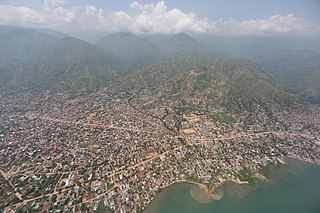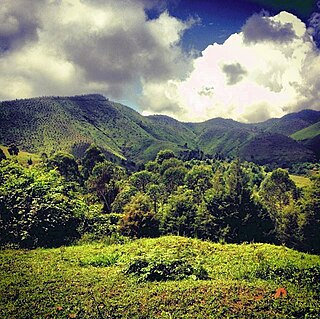
South Kivu is one of 26 provinces of the Democratic Republic of the Congo (DRC). Its capital is Bukavu.

Bukavu is a city in eastern Democratic Republic of the Congo (DRC), lying at the extreme south-western edge of Lake Kivu, west of Cyangugu in Rwanda, and separated from it by the outlet of the Ruzizi River. It is the capital of the South Kivu Province and as of 2012 it had an estimated population of 806,940.
Banyamulenge is a community that lives mainly in South Kivu province. The Banyamulenge are culturally and socially distinct from the Tutsi of South Kivu, with most speaking Kinyamulenge, a mix of Kinyarwanda, Kirundi, Ha language, and Swahili. Banyamulenge their role in Mobutu's war against and victory over the Simba Rebellion, which was supported by the majority of other tribes in South Kivu, their role during the First Congo War and subsequent regional conflicts (Rally for Congolese Democracy–Goma, Movement for the Liberation of the Congo, National Congress for the Defence of the People, and more importantly for the fact that two of the most influential presidents of their country declared them as enemy of the State both in 1996 and 1998.

Uvira is a city strategically located in the South Kivu Province of the eastern region of the Democratic Republic of the Congo. Covering approximately 16 square kilometers and with an estimated population of 726,000 as of 2024, it borders Bafuliru Chiefdom and Ruzizi Plain Chiefdom to the north, Bavira Chiefdom to the south, and Lake Tanganyika and the Ruzizi River to the east. These rivers form natural boundaries between the DRC and Burundi. Located in the Ruzizi Plain at a low altitude, the city lies between Burundi's Congo-Nile ridge and the Mitumba mountains.
Panzi Hospital and Foundation is a hospital in Bukavu, the capital of the Sud-Kivu province in the Democratic Republic of the Congo. It specializes in treating survivors of sexual violence, particularly conflict-related sexual violence.

Denis Mukwege is a Congolese gynecologist and Pentecostal pastor. He founded and works in Panzi Hospital in Bukavu, where he specializes in the treatment of women who have been raped by armed rebels. In 2018, Mukwege and Iraqi Yazidi human rights activist Nadia Murad were jointly awarded the Nobel Peace Prize for "their efforts to end the use of sexual violence as a weapon of war and armed conflict".
Mulenge is a village encircled by hills in the Kigoma groupement (grouping), within Bafuliiru Chiefdom, located in the Uvira Territory, South Kivu, in the eastern Democratic Republic of the Congo. It is situated on the high plateaus of the Itombwe massif, overlooking the locality of Uvira. The area has conventionally been inhabited by various ethnic groups, including the remnants of the autochthonous population of African Pygmies, as well as Bantu ethnic groups such as the Mbuti, Fuliiru, and Nyindu. The region boasts high agricultural productivity, with two harvests typically achievable each year.

The Fuliru people are a Bantu ethnic group native to the South Kivu Province of the eastern region of the Democratic Republic of the Congo. They predominantly inhabit the Uvira Territory, forming the largest ethnic group within the Bafuliiru Chiefdom, located centrally and to the northwest. They also form the primary constituency in the Ruzizi Plain Chiefdom, to the northeast, near the Rwanda and Burundi borders, where some Fuliru communities reside.

Uvira Territory is a territory located in South Kivu Province in the eastern region of the Democratic Republic of the Congo. Encompassing an area of roughly 3,146 kilometers and with a population estimate of 1,165,092 as of 2020, it is bordered by Walungu Territory to the north, Mwenga Territory to the west, and Fizi Territory to the south. The territory's southeastern boundary is defined by the city of Uvira, which attained city status on 13 June 2019, while the eastern perimeter adjoins the Republic of Burundi and Lake Tanganyika. Within the territory, Kiliba and Sange serve as significant towns.
Justin Bitakwira Bihona-Hayi is a Congolese politician and a member of the National Assembly. He is the founder of the Alliance pour la République et la Conscience Nationale political party (ARCN) and a member of the Union for the Congolese Nation. He has been affiliated with several political parties, including the Union for Democracy and Social Progress (UDPS) and the People's Party for Reconstruction and Democracy (PPRD). He held various government positions, including Minister of Rural Development, Minister of Communication and Media and Minister of Relations with Parliament. As a minister, his political principles were described as nationalist, populist, opportunist, reformist, tribalist, and protectionist.
The Kipupu massacre occurred on 16 July 2020 in the South Kivu village of Kipupu in the Mwenga Territory in the eastern Democratic Republic of the Congo. Gunmen belonging to the Ngumino and Twiganeho militias of the Banyamulenge community attacked the village and reportedly killed 220 people according to provincial lawmakers, while independent analysts state only 18 people were killed.
Lemera is one of the groupements (groupings) within the Bafuliiru Chiefdom, serving as the chief town of the chiefdom. Positioned in the northwestern part of Uvira Territory, Lemera spans an area of 37,527 square kilometers and, as of 2015, has an estimated population of 288,293, predominantly comprising Fuliiru people. Lemera shares borders with the Itara/Luvungi groupement to the north, the Kigoma groupement to the south, the Itombwe sector in Mwenga Territory to the west, and National Road No. 5 and the Ruzizi River to the east.

Katogota is a village located in the Itara-Luvungi grouping within the Bafuliiru Chiefdom in Uvira Territory of the South Kivu Province in the Democratic Republic of the Congo (DRC). Situated approximately 60 km south of Bukavu, Katogota is in close proximity to the Kamonyi and Rusagara villages, near the border regions of Rwanda and Burundi.
Bwegera is a village in the Bafuliiru Chiefdom in the Uvira Territory of South Kivu Province, Democratic Republic of the Congo. Bwegera has an elevation of 952 meters and is situated in the vicinity of the Kakamba and Nyaruhuhuma villages. The region It's crossed by Lake Tanganyika, providing a vital source of water and transportation for the local inhabitants. Bwegera is rich in building materials such as rubble, sand, and baked bricks, making it an ideal location for construction and development. The region also encompasses a vast rural area where agriculture, animal breeding, and fishing are the primary means of livelihood.

Kilungutwe is a small village in the Luindi Chiefdom, located in the valley of the Kilungutwe River in the Mwenga Territory of the South Kivu Province. Situated in the eastern part of the Democratic Republic of the Congo (DRC), Kilungutwe is positioned nearby neighboring villages of Kirukungutu and Chowe. The region is a melting pot for many ethnic groups, boasting a diverse ethnocultural landscape. It is also a point of confluence for numerous ethnic groups, including the Lega, Nyindu, Shi, Fuliiru, Holoholo, Bwari, Vira, Hunde, Nyanga, Bembe, and Amba people.

The Lemera massacre, also known as the Lemera Attack or Lemera Battle, which occurred on October 6, 1996, was a massacre perpetrated by the Alliance of Democratic Forces for the Liberation of Congo (AFDL) at Lemera Hospital, a medical facility in the small town of Lemera, about 85 kilometers northwest of Uvira in the South Kivu Province of the Democratic Republic of the Congo (DRC). 37 individuals were killed, according to the United Nations Mapping Report.

Jean Ruhigita Ndagora Bugwika, widely known as Ruhigita Ndagora, was a Congolese evangelist, superintendent, educator and pastor. Over the course of his 32-year tenure as the Legal Representative of the 8th CEPAC church, he solidified his position as a transformative leader in his community and beyond. He played an instrumental role in establishing two hospitals: the Lemera Hospital and Pinga Hospital. He spearheaded the creation of an extensive network of 35 health centers, strategically positioned to provide vital care to communities across the region. Moreover, he erected 56 social centers that imparted invaluable skills in areas such as tailoring and literacy, empowering women to forge their own paths towards self-sufficiency and success. Additionally, he established 412 primary and secondary schools.
Kiringye is a village situated in the Lemera groupement within the Bafuliiru Chiefdom, which is part of Uvira Territory in the South Kivu Province in the eastern region of the Democratic Republic of the Congo (DRC). The village is located at an elevation of 928 meters and is in close proximity to the localities of Luburule and Karenzu.

Uvira General Referral Hospital is a medical center located in Uvira, in the eastern region of the Democratic Republic of the Congo. As a general hospital, it provides a broad spectrum of medical services, including primary, secondary, and tertiary care. The hospital's services include emergency care, surgical procedures, maternal and pediatric services, and treatment for various medical conditions.
The Bafuliiru Chiefdom, also spelled as Chefferie de Bafulero, is a chiefdom located in Uvira Territory, South Kivu Province, in the eastern region of the Democratic Republic of the Congo.














